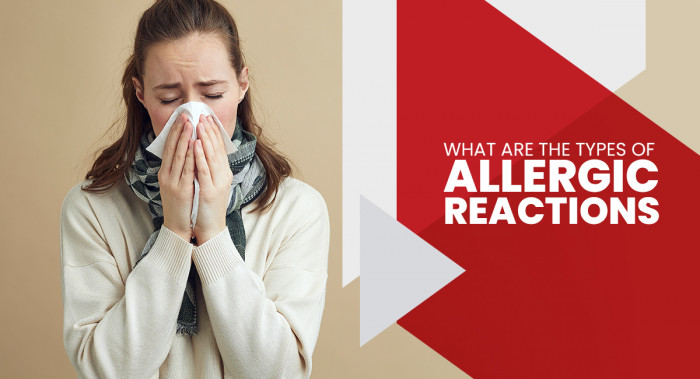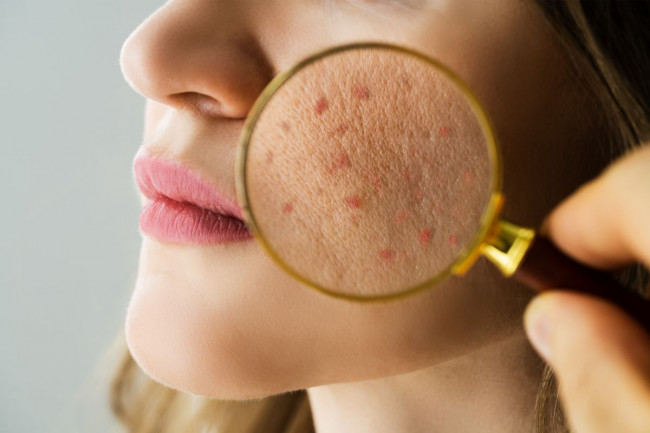
There are four types of allergic reactions that affect people and can lead to mild to severe, life-threatening symptoms, but you can learn to manage and prevent some reactions.
What Are The Types Of Allergic Reactions?
Allergic reactions are the immune system’s response to a harmful substance, known as an allergen.
Different types of allergic reactions can occur. Two British immunologists called, Philip Gell and Robert Coombs, classified the types of hypersensitivity reactions in 1963 as follows:
Immediate (type I) reaction
For this hypersensitivity reaction, the symptoms occur a few seconds or minutes after exposure to the allergen. Anaphylactic reactions are the most severe form of this allergic reaction. Anaphylaxis is serious and can cause a sudden, life-threatening respiratory failure.
The symptoms include low blood pressure, shock, bluish skin, swelling, and difficulty breathing. When this allergic reaction occurs, the body’s immune system produces IgE. The reaction often occurs from contact with certain foods, insect bites, pollen, dust mites, or animal dander.
Cytotoxic (type II)
The symptoms of cytotoxic reaction occur after some minutes to hours. The IgM and IgG antibodies damage cell when they activate the immune system’s complement system during the following.
· Immune thrombocytopenia
· Good pasture syndrome
· Autoimmune haemolytic anaemia
· Autoimmune neutropenia
· Myasthenia gravis
· Grave’s disease
Immune complex-mediated (type III)
The symptoms of the immune complex-mediated syndrome can last for several hours. The IgG and IgM antibodies react with the allergen to produce immunocomplexes, also called antigen-antibody complexes. The reaction occurs in:
· Arthus reaction
· Serum sickness
· Lupus
Delayed hypersensitivity (type IV)
The symptom of this allergic reaction occurs hours or some days after the reaction. It often results from long-term infectious diseases such as fungal infection and tuberculosis.
What symptoms do allergic reactions present?
Some common symptoms of an allergic reaction are:
· Runny nose
· Itchy, watery eyes
· Skin redness
· Swelling
· Itchy nose
· Rashes
· Sneezing
· Cough
· Pain
· Hives
· Vomiting
· Bloating
· Rashes
· Diarrhoea
· Stomach cramps
If you have an allergic reaction, seek immediate medical care. Anaphylaxis, which is severe and life-threatening, may present the following symptoms.
· Wheezing
· Severe skin rashes, including hives or itching
· Chest tightness
· Shortness of breath
· Uterine cramps
· Lightheadedness, fainting, and dizziness
· A feeling that something awful wants to happen
· Stomach pain, diarrhoea, bloating, or vomiting
· Swelling of the tongue, throat, or lips
What can cause allergic reactions?
Different things can trigger an allergic reaction, but the most common allergy triggers are:
· Certain foods
· Drugs
· Latex
· Mould
· Pollen
· Pet dander
· Insect bites or stings
What is the treatment for allergic reactions?
The best treatment for allergic reactions is to avoid contact with known allergens. You can remove allergens in your home when possible and reduce airborne allergy symptoms by washing out your nose every day using a squeeze bottle filled with nasal saline or Neti pot.
Some medications for treating symptoms of an allergic reaction include:
· Antihistamines – best for indoor and seasonal allergies
· Nasal corticosteroids – effective for nasal allergies
· Decongestants – to reduce stuffiness, but avoid using a nasal decongestant spray for over three days in a row because it can cause a rebound reaction that makes the stuffiness and swelling in the nose worse
· Corticosteroids ointments or creams to stop the spread of rashes or relieve itchiness
· Mast cell stabilisers to relieve itchy, runny nose or eyes
· Oral corticosteroids – to reduce the swelling and stop severe reactions
· Epinephrine – for life-threatening anaphylaxis or severe allergic reaction.
It is available as an auto-injector pen device and requires use within minutes of the first sign of any serious allergic reaction to latex, medications, insect stings, and food.
If you experience certain symptoms of allergic reactions but are unsure what causes them, you can visit Private Blood Tests London for allergy testing London. Call 020 7183 0244 for an appointment for your allergy testing.
Causes of Allergies
Foreign materials that may be liquid, solid or gas are sometimes toxic to our bodies, though they may be harmless in our environment. They become causes of hypersensitive reactions when they break through our natural defences. These bodies could be ingested, inhaled, injected or sensed by our bodies.
The signs of allergies are our body's way of acting against these foreign materials through antibodies and histamines.
Managing Results
If you notice symptoms of allergies, do not stall. If your symptoms last for a week or more, book an appointment with an immunologist as soon as possible.
A Scratch test is essential in testing for and identifying specific antigens responsible for your symptoms. The doctor pricks your skin with an antigen extract and observes your skin for a reaction. Instead of a skin test, a blood count is done. The blood count is not as painful as the skin/scratch test. It assesses the number of antibodies generated by your body's system. A higher amount of certain antibodies implies a possible allergy to the antigen.
There are other kinds of testing available.
How to Treat Allergy
Although staying away from allergic substances is an excellent remedy, it does not stop the reaction.
Medications such as antihistamines– Zyrtec, Allegra–, medications relieving congestion– Sudafed, or OTCs are medications for treating allergies. Nasal decongestants, including nasal steroids like Nasonex, Flonase, cromolyn sodium, etc., are medications for treating hypersensitive reactions.
Asthma remedies which relieve allergies are:
· Inhaled bronchodilators
· Inhaled steroids
· Oral bronchodilators –theophylline
· Oral anti-leukotrienes montelukast, Singulair, zafirlukast– Accolate and zileuton –Zyflo
· Inoculated medications, including omalizumab– Xolair, dupilumab– Dupixent, reslizumab, benralizumab –Fasenra, or Mepolizumab– Nucala
Biological testing, also known as "allergy shot therapy or oral immunotherapy, is required if your symptoms are not adequately managed by a measure of procedures and medication application. It has been applied and proven effective in some asthmatic patients.
Saline irrigation is an alternative treatment method using a sinus rinse kit. These sinus rinse kits are OTCs or can be prepared at home. For homemade kits, get half a teaspoon of salt and baking soda, and mix in eight ounces of boiling water. This recipe washes away antigens and reduces the percentage of breakouts.
Diagnosis
Are Allergies Curable?
You cannot cure allergies, but their symptoms can be managed, following the measures and treatment procedures, including immunotherapy in particular situations.
Our private allergy testing UK team is readily available to help you identify and manage your allergies effortlessly. Book an appointment with us on 020 71830244, and our competent immunologists will be available to counsel and guide you.














